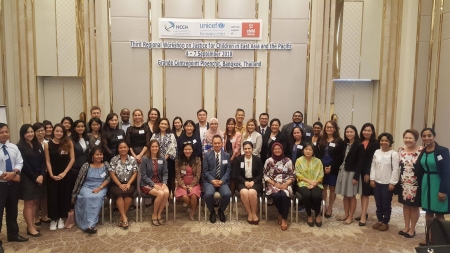 Altangerel.Ch, Director of Secretariat of the National Human Rights
Commission of Mongolia, has participated in the "Third Asia-Pacific Regional
Workshop on Justice for Children in East Asia and the Pacific” in Bangkok,
Thailand from 4-7 April 2018. The main purpose of the workshop was to strengthen the comprehensive cross-border
child protection system in the Asia-Pacific region, to improve the
implementation of the International Convention on Child Protection adopted by
the Hague Conference on International Private Law and to extend cooperation between
law enforcement agencies, government and non-government organizations,
international and UN specialized agencies and experts. In addition, the
participants were expected to share their information and experiences on issues
related to cross-border migration, cyber-attacks and child protection in terms
of international child adoption and surrogacy.
Altangerel.Ch, Director of Secretariat of the National Human Rights
Commission of Mongolia, has participated in the "Third Asia-Pacific Regional
Workshop on Justice for Children in East Asia and the Pacific” in Bangkok,
Thailand from 4-7 April 2018. The main purpose of the workshop was to strengthen the comprehensive cross-border
child protection system in the Asia-Pacific region, to improve the
implementation of the International Convention on Child Protection adopted by
the Hague Conference on International Private Law and to extend cooperation between
law enforcement agencies, government and non-government organizations,
international and UN specialized agencies and experts. In addition, the
participants were expected to share their information and experiences on issues
related to cross-border migration, cyber-attacks and child protection in terms
of international child adoption and surrogacy.
 During the workshop, the participants discussed about the most pressing
issues in the Asia-Pacific region, which is violence against children, and
sexual and labour exploitation, and a need to establish international
cooperation on prevention from crimes of human trafficking, and implementation
of international treaties and conventions related to aforementioned issues as
well as to create a cross-border comprehensive child protection system.
During the workshop, the participants discussed about the most pressing
issues in the Asia-Pacific region, which is violence against children, and
sexual and labour exploitation, and a need to establish international
cooperation on prevention from crimes of human trafficking, and implementation
of international treaties and conventions related to aforementioned issues as
well as to create a cross-border comprehensive child protection system.
The Third Workshop was organized by the UNICEF Regional Office for East Asia and Pacific (EAPRO) and the Hague Conference on Private International Law (HCCH), with the support of Child Redress. Over 65 professionals, including government officials, non-government organizations, international funds, UN specialized agencies, experts and legal practitioners participated in this Workshop.
The Hague Conference on Private International Law is an intergovernmental organization with legislative functions to support the improvement of the co-ordination between government and law enforcement agencies and to ensure the best interests of the child in international law and court practice for the purpose of improving the implementation of the United Nations Convention on the Rights of the Child by ratifying the following conventions: Convention on the Legal prohibition against trafficking of children of 1980, the Convention on the Protection of Children and Co-operation in Respect of Intercountry Adoption of 1993, and the Convention on Child Protection of 1996 and the Convention on the Protection for a Child Deprived of Family Environment of 2007. Mongolia has adopted the Convention of Civil Procedure of 1954 and the Convention Abolishing the Requirement of Legalisation for Foreign Public Documents of 1961, which were adopted by this Institute.
In addition to the representative from the National Human Rights Commission of Mongolia, Ms. Bayarmaa N, Head of the Department of the Ministry of Labor and Social Welfare, and Ms. Amaraa D, UNICEF Child Protection Specialist also participated in the workshop. Mr. Altangerel Ch, the Director of Secretariat of the NHRCM, made a presentation on the "Implementation of Environmental Laws in Mongolia - Child Protection Challenges" during the session on "Legal governance in environmental sector and the rights of children". The presentation included the statistic data and evidences on the implementation of Mongolian environmental laws as well as emerging issues related to child protection including adverse health impacts on children caused by air pollution and family relations, education, health and safety issues derived from the mining migration. In particular, the impacts of mining-related in-migration on children as well as children of affected families drew attention of participants and raised the discussion among them.
Furthermore, it is necessary to conduct a comprehensive research on whether Mongolia should accede to the Convention on the Legal prohibition against trafficking of children in 1980, the Convention on Child Protection in 1996 and the Convention on the protection for a child deprived of family environment in 2007, which are ratified by The Hague Conference on Private International Law, and to see whether the regulations of the Conventions can be in compliance with domestic laws. Asides that, there is a need to collaborate on organizing training and advocacy work for government and law enforcement officials.

